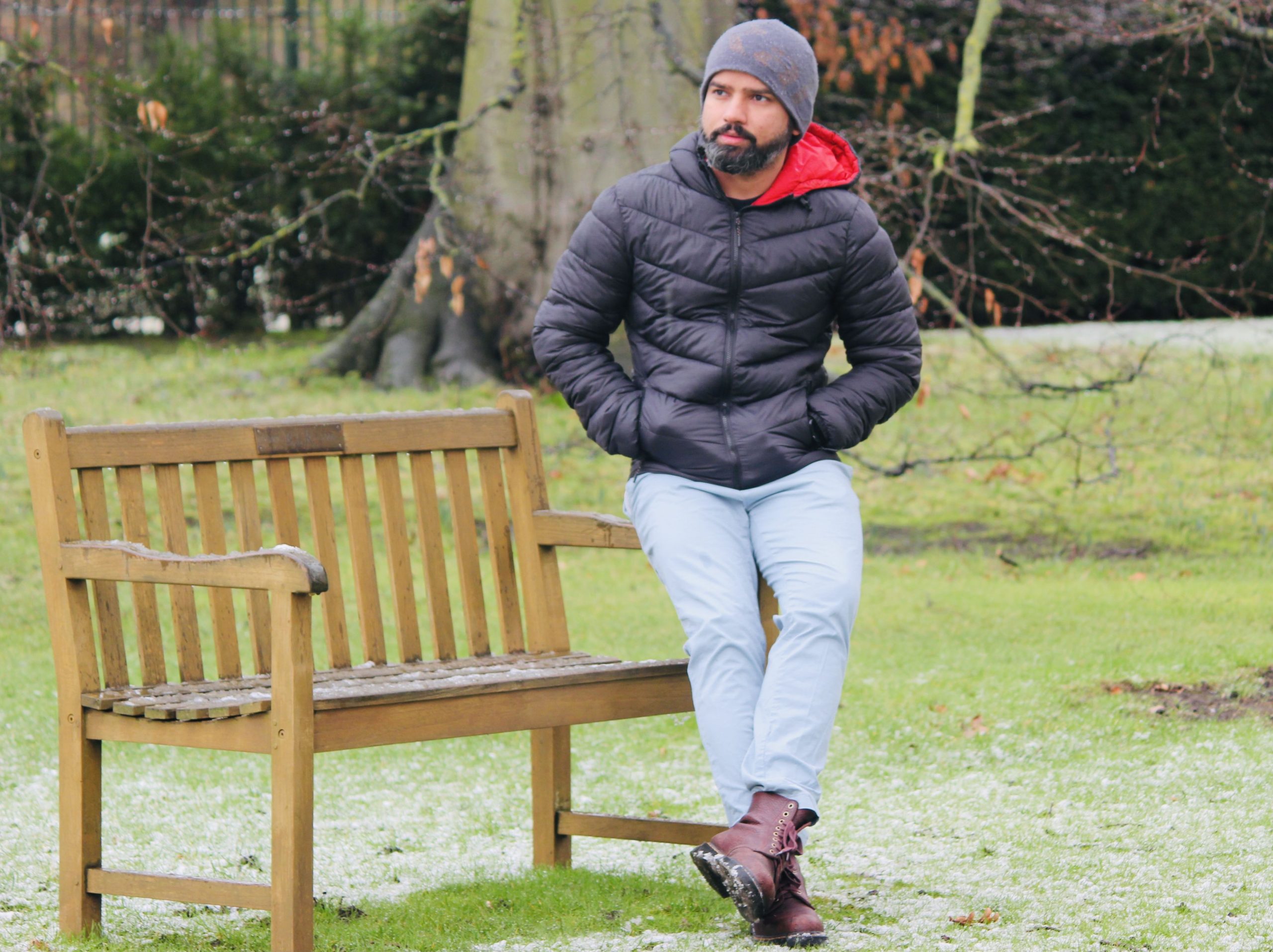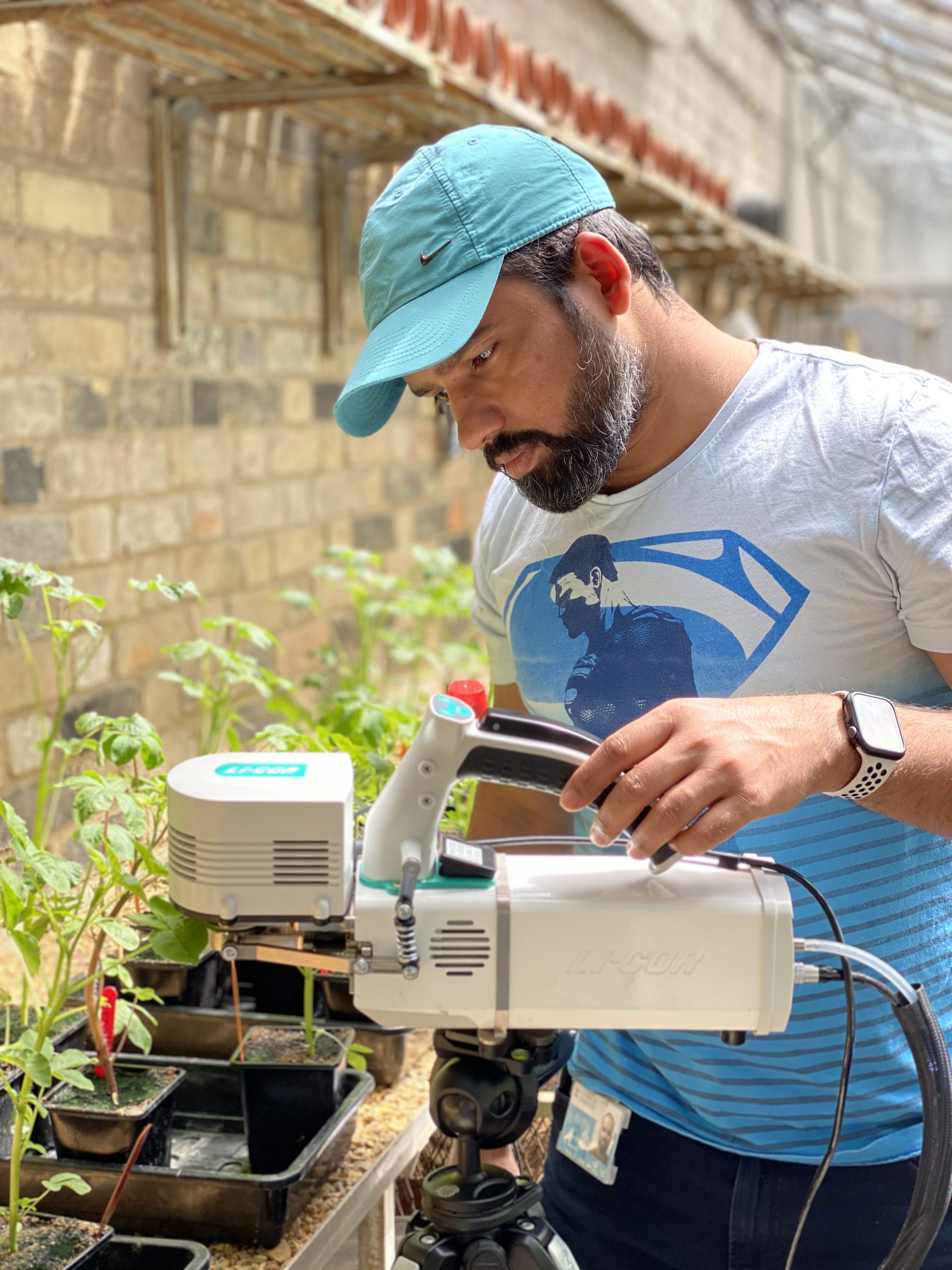
Anoop Tripathi talks about his aim to address food insecurity through his plant research.
My research will potentially increase rice production by 50% and ensure food security for the world.
Anoop Tripathi
Anoop Tripathi [2022] is one of the few people in the world who have experience of using a newly developed technique of cereal grafting and hybridisation which could help save some crops threatened by climate change and disease.
As Senior Research Laboratory Technician at the University of Cambridge he has been working on the new grafting technique which overturns the long-standing consensus that monocot plants such as grass and grass-like flowering plants cannot graft. A paper published late last year, led by Gates Cambridge Scholar Greg Reeves, applied the process to bananas which are threatened with a disease which could result in global banana shortages.
Anoop is now the only person left at Cambridge who has the knowledge to take that research forward and, as a Gates Cambridge Scholar from this autumn, he plans to do so in an attempt to improve the photosynthetic properties of rice plants, making them able to grow with less water.
Anoop says: “As Spiderman says, “with great power comes great responsibility”. This Gates Cambridge scholarship will give me the power to help people through my passion for research. My research will potentially increase rice production by 50% and ensure food security for the world.”
Childhood
Anoop’s desire to help others, particularly farmers, and his persistence were honed from an early age. Born in Ayodhya in India in 1987, his father was a banker who worked in a regional bank in Uttar Pradesh which meant he had to transfer to another part of the state every five to six years. At first the family of nine children, including Anoop’s cousins, moved around with him, but later they stayed in one place and his father commuted to work.
Anoop’s mother was a big inspiration. A self-made person, she always told him that he should not listen to any negative voices about his abilities. She nursed him through the various falls and skin problems he had as a young boy and got him to take his medicine by playing games to distract him. His grandfather also reinforced the message of not giving up and learning from failure. Those messages were to prove important in shaping Anoop’s view of life and his determination not to feel disheartened by setbacks.
Anoop was the youngest child and describes himself as an introvert and loner who was mature for his age, someone who was curious to try out new things, such as being on the football team. He was very interested in the world around him and in the summer would go to his maternal grandparents where his grandfather would teach him about hands-on practices in agriculture, such as how to weed and how to do litmus tests on soil quality. He developed a deep respect for farmers. “My grandfather taught me that if you see any problem you need to go to the root of it to solve it more efficiently than if you start from the top and don’t see the whole picture,” says Anoop.
Anoop’s family was very focused on science, and he was good at maths and biology. He could see, growing up, that the healthcare system in his area was not good so he decided he wanted to work in health policy. To do so he needed to understand how the system worked so he applied to medical school and had to sit a national exam. He couldn’t get into the college he wanted after two years of trying, which involved reading widely on the subject. So, Anoop opted instead for a BSc, initially in Zoology, Botany and Chemistry at the University of Lucknow, later focusing on just Botany and Chemistry.
Undergraduate studies
One of his first classes in Botany involved making a section in a dicot plant. His professor showed the other students what he had managed to do. The experience was a turning point for Anoop and cemented his idea that he could be a botanist. He spent his undergraduate years learning how to recognise the different plants in the university grounds and over the summer he would go back home and talk to local farmers about what he had learnt about, for instance, pesticides. “Most of the farmers were illiterate so were unable to follow written instructions,” he says. “No-one was trying to inform them in ways they could understand. Everything I was learning I used to educate them.”
Anoop finished his degree in 2008 and was set on becoming a civil servant so he could improve people’s lives. He decided, however, that he needed to do a master’s in Biochemistry in order to have a better understanding of plants and the relationship between plants and animals. During his master’s he did a six-month internship in a laboratory helping a PhD student.
After graduating in 2010, Anoop moved to Delhi and started preparing for the national civil services exam. He spent the next five years trying to get in, determined not to give up. During that time he visited the slums of Delhi and talked to children who were excluded from school and their parents, trying to help them get an education. By 2015, Anoop’s father was preparing to retire and Anoop felt he needed to move his life on.
He passed scholarship exams like CSIR-NET, GATE and ICAR-SRF in order to keep his scientific skills up to date and in 2015 became a senior research fellow at the National Bureau of Plant Genetic Resources in New Delhi and was working on a project focused on understanding the evolution of photosynthesis. It involved comparing C3 plants – different rice varieties – with C4 plants like millet in a bid to make more efficient rice plants. The project opened up new doors for Anoop and connected him with what researchers outside India were doing, including a project at the University of Cambridge which was funded by the Bill & Melinda Gates Foundation. Through this he came across the work Gates Cambridge Scholar Greg Reeves was doing on monocot grafting.
Cambridge
Around this time Anoop suffered a series of family bereavements. His grandparents died and a nephew who he was very close to drowned in a river aged 12. Anoop used to spend the summers with his nephew while his sister worked and the two had a very close relationship. His death was to prove a breaking point for Anoop, and he started to look at moving abroad. His girlfriend was doing postdoctoral research in the Department of Plant Sciences at Cambridge, and he decided to move there.
 At first Anoop was very introverted, but after a few months he started volunteering for charities and talking to people and his confidence grew. He applied for jobs at the university and finally got one working with Greg Reeves on monocots. He started work as a lab technician in January 2020, having to reschedule everything because of Covid. During one of the update meetings with Ceres Agri-Tech and Cambridge Enterprise, he was asked what he thought about the research. “It was a profound moment that people might be interested in what a technician thought,” he says. He had never thought about doing a PhD before, but, after he was credited as second lead author on Reeves’ banana paper and because of the insightful and motivational nature of the research he was doing, the idea started to take seed.
At first Anoop was very introverted, but after a few months he started volunteering for charities and talking to people and his confidence grew. He applied for jobs at the university and finally got one working with Greg Reeves on monocots. He started work as a lab technician in January 2020, having to reschedule everything because of Covid. During one of the update meetings with Ceres Agri-Tech and Cambridge Enterprise, he was asked what he thought about the research. “It was a profound moment that people might be interested in what a technician thought,” he says. He had never thought about doing a PhD before, but, after he was credited as second lead author on Reeves’ banana paper and because of the insightful and motivational nature of the research he was doing, the idea started to take seed.
Anoop says that when he applied to do a PhD, he began thinking about his career to date and how he could go full circle and help rice farmers in his country. India is the second largest grower of rice in the world. Anoop knows first-hand how rice fields work and about all the irrigation problems as well as the impact of climate change. He was keen to design a project that could introduce some of the qualities of other crops into rice and believes that, by using somatic hybridisation, the photosynthetic efficiency of millet plants can be transferred to rice which will mean rice can grow with less water. Anoop is keen to ensure that such grafting will benefit farmers in places like India and says that requires understanding the challenges they face with post-harvest processes.
He is also motivated to become a STEM ambassador at schools in India. Most scientific equipments are not accessible to schools in remote areas. After finishing his PhD, he will also focus on creating a Mobile-Science Lab, which will be equipped with scientific instruments and will be able to cover many schools in a particular area.
Eventually Anoop wants to return to India and to work with farmers to teach them how they can get better results and ensure his research has maximum impact in the real world. “If you are sitting at the top table, you don’t know all that is going on underneath,” he says.
He adds that another quote from Spiderman inspires him. It says: “Not everyone is meant to make a difference. But for me, the choice to lead an ordinary life is no longer an option.” Anoop states: “Living an ordinary life is no longer an option for me. I must be a point of change and inspiration for people all over the world who come from a similar background to mine.”












